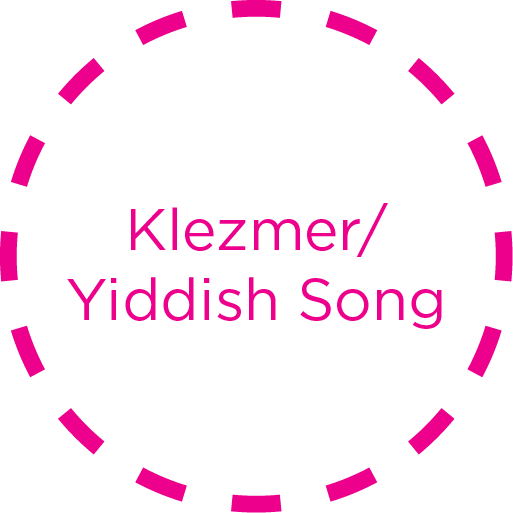Kale Bazetsns, Doinas and Klezmer Modulation with Josh Horowitz (Mini-Course): Monday 1:45 – 3:00 PM New York Time: Oct 28, Nov 4, 11, 18, 25
Monday 1:45 – 3:00 PM New York Time: Oct 28, Nov 4, 11, 18, 25
Course Goals: This class shows how to improvise Kale Bazetsns (songs to make the bride cry) and doinas, as well as how to move from mode to mode in klezmer music. Part theory, part playing, part ear training and part exploration, students will learn to identify and play simple and complex modal modulations. The modulations are grouped systematically into families which can be comfortably comprehended and navigated. Emphasis will be on the 4 types of modulation: simple, complex, modal interchange and sequential progression. The aim will be to have students hear and react quickly to every modulation situation encountered in klezmer music and to be able to understand where new modulation possibilities that are not found in the literature or in recordings can be developed. Students will learn how to predict modulation types from the beginning section of a tune and to understand tune types according to their modulation structures. The class is meant to help students with a fear of theory to have fun and be instructive at the same time.
Course Tools: Syllabus, teaching materials, articles and some recordings will be provided as needed.
Additional Info: For intermediate to advanced students. No previous klezmer experience is required though helpful, but knowledge of instrument and intermediate music reading ability is required for reading simple lead sheets. Basic theory knowledge of scales and intervals is necessary.
Monday 1:45 – 3:00 PM New York Time: Oct 28, Nov 4, 11, 18, 25
Course Goals: This class shows how to improvise Kale Bazetsns (songs to make the bride cry) and doinas, as well as how to move from mode to mode in klezmer music. Part theory, part playing, part ear training and part exploration, students will learn to identify and play simple and complex modal modulations. The modulations are grouped systematically into families which can be comfortably comprehended and navigated. Emphasis will be on the 4 types of modulation: simple, complex, modal interchange and sequential progression. The aim will be to have students hear and react quickly to every modulation situation encountered in klezmer music and to be able to understand where new modulation possibilities that are not found in the literature or in recordings can be developed. Students will learn how to predict modulation types from the beginning section of a tune and to understand tune types according to their modulation structures. The class is meant to help students with a fear of theory to have fun and be instructive at the same time.
Course Tools: Syllabus, teaching materials, articles and some recordings will be provided as needed.
Additional Info: For intermediate to advanced students. No previous klezmer experience is required though helpful, but knowledge of instrument and intermediate music reading ability is required for reading simple lead sheets. Basic theory knowledge of scales and intervals is necessary.
Monday 1:45 – 3:00 PM New York Time: Oct 28, Nov 4, 11, 18, 25
Course Goals: This class shows how to improvise Kale Bazetsns (songs to make the bride cry) and doinas, as well as how to move from mode to mode in klezmer music. Part theory, part playing, part ear training and part exploration, students will learn to identify and play simple and complex modal modulations. The modulations are grouped systematically into families which can be comfortably comprehended and navigated. Emphasis will be on the 4 types of modulation: simple, complex, modal interchange and sequential progression. The aim will be to have students hear and react quickly to every modulation situation encountered in klezmer music and to be able to understand where new modulation possibilities that are not found in the literature or in recordings can be developed. Students will learn how to predict modulation types from the beginning section of a tune and to understand tune types according to their modulation structures. The class is meant to help students with a fear of theory to have fun and be instructive at the same time.
Course Tools: Syllabus, teaching materials, articles and some recordings will be provided as needed.
Additional Info: For intermediate to advanced students. No previous klezmer experience is required though helpful, but knowledge of instrument and intermediate music reading ability is required for reading simple lead sheets. Basic theory knowledge of scales and intervals is necessary.


